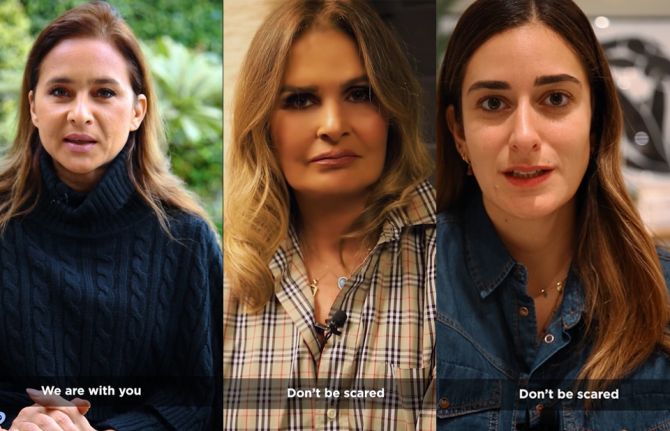

Feature Story
New awareness campaign on gender-based violence in the Middle East and North Africa
25 November 2020
25 November 2020 25 November 2020Like HIV, the COVID-19 pandemic thrives on inequalities and inequities. In addition to its impact on people’s health, the COVID-19 pandemic has resulted in significant increases in gender-based violence around the globe, including in the Middle East and North Africa.
Some countries in the region lack essential services for survivors of violence, especially in, for example, rural areas, conflict zones or humanitarian settings. Where services do exist, they do not always reach marginalized women and girls, and in many cases have been reduced or de-prioritized during the pandemic. Gender-based violence in the Middle East and North Africa is also sometimes not prioritized by the police and justice systems and many countries do not criminalize domestic violence, marital rape and other forms of gender-based violence that are particularly relevant in the region, such as female genital mutilation.
The United Nations Issue-Based Coalition on Gender, Justice and Equality is taking a twin-track approach to gender-based violence in the region, combining a programmatic response that prevents gender-based violence and supports survivors with the launch of a region-wide awareness campaign. The campaign uses the regional goodwill ambassadors of the coalition United Nations agencies to shed light on the risks that women and girls face as a result of the health crisis and to raise people’s awareness on how to counter gender-based violence and support survivors.
“Any form of violence against women and girls is a direct violation of human rights. I want to assure every violated woman and girl through this campaign that we are all with you,” said Yousra, UNAIDS Goodwill Ambassador for the Middle East and North Africa.
The joint campaign is an illustration of the strength of collaboration among United Nations agencies and what partnerships can do in building and empowering the global appeals and calls to action of the United Nations Secretary-General and the Spotlight Initiative, a global, partnership between the European Union and the United Nations to eliminate all forms of violence against women. The campaign leverages the ability of regional celebrities to reach local communities to raise awareness on the compounding impact of COVID-19 on gender-based violence and the vulnerabilities of marginalized and vulnerable groups.
“The response to COVID-19 in this region, and globally, has shown us that when we act in solidarity, in true partnerships and with a sense of shared responsibility, we can win against the intertwining health threats of COVID-19, HIV and the shadow pandemic of gender-based violence,” said Rangayian Gurumurthy, Director, a.i., of the UNAIDS Regional Support Team for the Middle East and North Africa.
“During COVID-19, most of us are confined in our homes with our partners. This has increased relationship problems, as well as social and economic problems. Many are subjected to violence from our close family or our intimate partner. That is why our nongovernment organization dedicated a hotline for psychological support,” said a woman living with HIV in the Islamic Republic of Iran.



